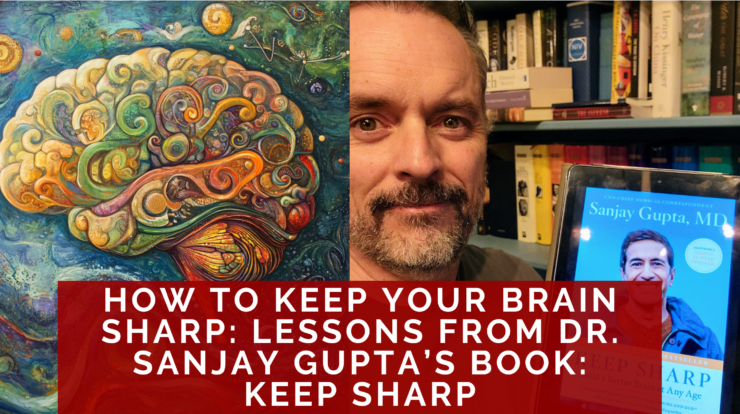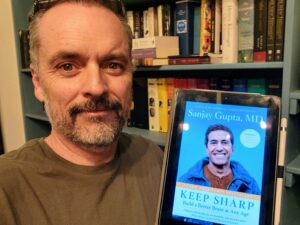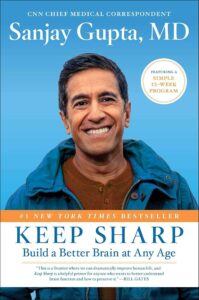
How to Keep Your Brain Sharp: Lessons from Dr. Sanjay Gupta’s Keep Sharp
I usually talk about the art business, galleries, and the creative world, but today, I want to share something a little different—a book review on a topic that’s been on my mind lately: brain health.
As I’m approaching a significant birthday, I’ve been thinking more about what it means to age well. While I’ve always tried to live a healthy lifestyle—running since my early 20s and eating relatively well thanks to my nutrition-savvy wife, Carrie—the last few years have made me realize that there’s more I could be doing, especially when it comes to my brain health.
 That’s what led me to Dr. Sanjay Gupta’s book Keep Sharp: Build a Better Brain at Any Age. Dr. Gupta is a well-known neurosurgeon and CNN’s chief medical correspondent. Part of what motivated him to write Keep Sharp was watching family members struggle with mental decline. In his book, he sets out to debunk myths about memory loss and offers practical advice on how we can take care of our brains as we age.
That’s what led me to Dr. Sanjay Gupta’s book Keep Sharp: Build a Better Brain at Any Age. Dr. Gupta is a well-known neurosurgeon and CNN’s chief medical correspondent. Part of what motivated him to write Keep Sharp was watching family members struggle with mental decline. In his book, he sets out to debunk myths about memory loss and offers practical advice on how we can take care of our brains as we age.
The Personal Side of Brain Health
This topic hits close to home for me. I watched my own grandmother suffer from Alzheimer’s disease and slowly lose her memories of her family, friends, and ultimately, her own life. Witnessing that was heartbreaking, and for a long time, I believed that Alzheimer’s and dementia were largely hereditary—that if you were destined for these diseases, there wasn’t much you could do to stop them.
But Dr. Gupta challenges that idea. He argues that mental decline is about 10% genetic and 90% lifestyle-related. Initially, I was skeptical, but the evidence he presents is compelling. He draws from his extensive research and medical experience, making a strong case that we can take proactive steps to maintain mental sharpness and delay memory loss.
The Five Pillars of Brain Health
Dr. Gupta boils his advice down to five key areas: exercise, mental engagement, sleep, nutrition, and social connections. None of these concepts are revolutionary, but they are powerful reminders of how much control we have over our brain health—and our overall health—through everyday choices.
Here’s a closer look at each pillar:
1. Exercise
Dr. Gupta emphasizes that regular exercise is one of the most effective ways to protect both your brain and your body as you age. He recommends aiming for at least 150 minutes of exercise per week. For me, this was reassuring—I’ve been consistent with running for decades, but Gupta suggests mixing things up with strength training, resistance exercises, and interval training to optimize the benefits. Even if you’re not particularly active now, it’s never too late to start.
2. Mental Engagement
Keeping your brain active and challenged is crucial for maintaining cognitive function. Dr. Gupta discourages early retirement, as staying engaged in meaningful work can help stave off cognitive decline. For artists like many of my readers, this is good news—your creative work naturally keeps your brain stimulated. But it’s also important to keep learning, whether through new hobbies, ongoing education, or engaging in complex problem-solving.
3. Sleep
Sleep is one of those areas that seems simple but is incredibly important for brain health. Dr. Gupta suggests sticking to a regular sleep routine—going to bed and waking up at the same time every day, even on weekends. While it’s something I’ve struggled with over the years, it’s clear that quality sleep is essential for everything from memory retention to emotional well-being. According to Dr. Gupta, your brain is doing a lot of important work while you sleep, so it’s critical not to skimp on rest.
4. Nutrition
This is one area where I have room for improvement. Dr. Gupta advocates for a brain-healthy diet, particularly the Mediterranean diet, which focuses on leafy greens, berries, fish, and nuts while cutting back on processed foods and added sugars. Even though I try to eat healthily, I have a soft spot for sweets, so this is something I need to work on. Gupta’s message is clear: what you eat has a direct impact on your brain health.
5. Social Connections
Social engagement is a powerful predictor of health in later life, according to Dr. Gupta. Having strong relationships with friends and family helps protect against cognitive decline. As artists, it’s easy to get lost in the solitude of the studio, but staying connected—whether through in-person interactions or even online communities—can make a big difference. Gupta also points out that volunteering is a great way to build social ties and reduce stress.
Managing Stress and Finding Joy
In addition to these five areas, Dr. Gupta highlights the importance of managing stress. He suggests mindfulness practices, spending time in nature, and unplugging from our devices as ways to reduce stress and improve brain health. For me, volunteering has been a great way to take a break from the pressures of daily life and focus on helping others. Dr. Gupta argues that we need to prioritize these activities if we want to improve our brain health.
And finally, he emphasizes gratitude and laughter as key components of well-being. Laughter truly is great medicine, and focusing on the things we’re grateful for can have a profound impact on our long-term health.
A Final Word on Keep Sharp
 Dr. Gupta’s Keep Sharp is full of practical advice and backed by scientific research, but what I appreciated most was his positive, accessible style. The book is a quick read, and even though it covers complex scientific topics, it’s easy to follow and full of relatable anecdotes. Gupta also includes a 12-week program to help readers start implementing changes step by step. It’s one of the more engaging self-improvement books I’ve read, and I highly recommend it to anyone looking to protect their brain health as they age.
Dr. Gupta’s Keep Sharp is full of practical advice and backed by scientific research, but what I appreciated most was his positive, accessible style. The book is a quick read, and even though it covers complex scientific topics, it’s easy to follow and full of relatable anecdotes. Gupta also includes a 12-week program to help readers start implementing changes step by step. It’s one of the more engaging self-improvement books I’ve read, and I highly recommend it to anyone looking to protect their brain health as they age.
If you’re interested in reading Keep Sharp, you can find it here: https://amzn.to/3Bo5P5M (This is an affiliate link. As an Amazon Associate, I earn from qualifying purchases at no additional cost to you.)
I’d love to hear from you—what are you doing to improve your memory and mental acuity? Do you have any book recommendations for staying sharp as we get older? Let me know in the comments!
I loved this post, Jason, and want to tell you both my husband and I practice Dr. Gupta’s five steps, some more than others. We are both in our 70s. Larry is writing a book, and I am painting, playing Native American flute, and studying mythology. Larry converted from a red meat eater to Mediterranean meals and cooks dinner for us! Thank you for encouraging artists to try this path.
Love this Mary – you and your husband are an example to us all!
Sleep is one area that is almost invisible. I found the Oura Ring to be really helpful and motivating for my sleep and keeping me on track. Often measuring and monitoring something makes one more aware. Keeping a consistent sleep schedule has helped reduce my migraines The ring tracks your REM and deep sleep, the amount of sleep and invisible rhythms like your heart rate and oxygen levels, plus your daytime stress and activity levels. I know I’m sounding like a sales person, but I have really found this device to be helpful in keeping my goals.
Great input, Anna – sleep is so important. I’ve been tracking mine with my smart watch, which has helped be do better getting to bed at a consistent time.
Thanks for the tip! About to go through a big life change and now looking at the light at the end of the tunnel getting really close. Stress!